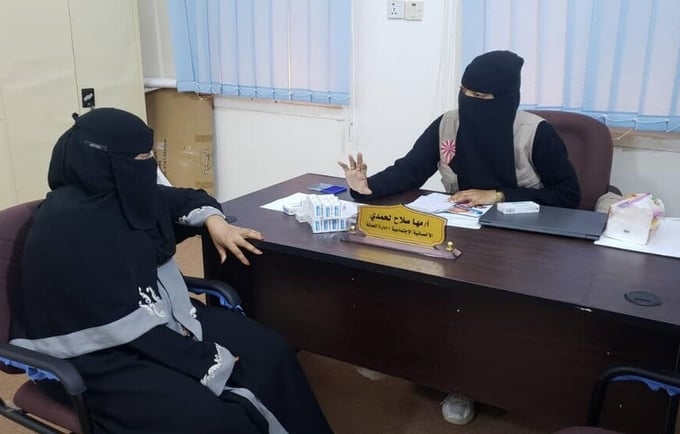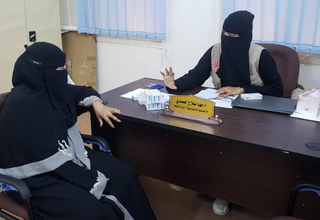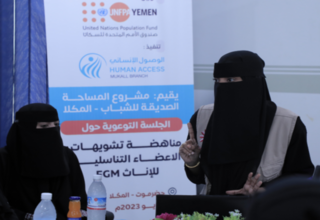Hadramout Governorate, Yemen – “I lost my baby in front of my eyes”, tells Safia* 22, from a remote village in Hadramout Governorate.
Safia’s marriage was arranged when she turned 21 to a man from a rural and small village in Hadramout. A year later she fell pregnant.
“The news of my pregnancy bought lot of joy to me and my husband; we were very excited to be parents for the first time,” Safia tells UNFPA.
Two month before the delivery, Safia’s mother-in-law informed her of the practice of female genital mutilation – a religious and social practice to purify the child to lead a moral life – the mother in law claimed.
“As a pregnant woman, I had no idea about the harm female genital mutilation can have for girls. My mother-in-law kept insisting that it would allow my child to lead a moral life,” tells Safia.
Three days after Safia gave birth, her mother-in-law came home with tools to perform the procedure.
“She (mother-in-law) took my three-day-old baby to her arms and carried out the procedure. It was the most unbearable sight, as my baby was being cut with a sharp blade,” adds Safia.
Safia’s baby screamed in pain and bled profusely. She began to lose choke and eventually died.
“Her death not only killed my joy of being a mother but killed me a thousand times over,” tells Safia.
Seeking an end to the practice
Safia went into a deep state of depression as sadness and regret kept recurring in her mind.
“I began to blame myself for not doing anything to save my daughter and to question myself as to why she was killed in this brutal way for being a girl.”
This feeling accompanied Safia for a year and worsened when she fell pregnant again with a girl. She began to fear the fate awaiting her unborn child. In turn Safia sought advice from a neighbor who had given birth to a girls and escaped female genital mutilation being imposed by the in-laws.
“My neigbour told me about an awareness programme she attended at a youth-friendly safe space that helped to save her daughter from female genital mutilation by convincing her husband and his parents about the dangers of this practice.”
Following the neigbours advice, Safia visited the UNFPA-supported youth friendly safe space. The female case worker requested Safia to bring her husband and mother in law to the safe space. With a lot of persuasion from her husband who was also traumatized by the death of his child, the mother-in-law agreed to visit.
“The three of us listened for over three hours about the physical, mental and social effects associated with female-genital mutilation. We became aware of how harmful this practice is and was fully convinced that it should not be practiced and everyone in my village show be informed aswell.”
“In this way and with this help of the Youth Friendly Space, I saved the life of my second daughter. With this awareness, I believe I can help to spare the life of many innocent girls,” states Safia.
Prevelance of female-gential mutilation in Yemen
Female genital mutilation/cutting, a violation of human rights, remains common in the coastal areas of Yemen. Highest prevalence in the governorates of Al-Mahrah (85%) Hadramout (80%), Al-Hodeidah (62%) and Aden (22%).
The Demographic and Health Survey (DHS) of 2013 states that 19 per cent of all women and girls aged 15-49 in Yemen have undergone some form of female genital mutilation in Yemen. Nintey-six per cent of the cases occur before girls reach five years of age. Nine in 10 girls who were cut experienced the practice within their first week of life.
For girls and women aged 15-49, eighty-five per cent was performed by traditional practitioners; 13% by medical practitioners.
A cross-sectional survey conducted among 646 women and 345 men from six districts in three Yemeni coastal governorates between July and September 2020 found the prevalence of female genital mutilation in Yemeni coastal areas was 89 percont among women and 79.8 per cent among the youngest daughters in the surveyed families. Nearly two-thirds of women and half of the men recorded a poor knowledge level about the harms of the practice.
UNFPA's response
The UNFPA-UNICEF joint programme on the elimination of female genital mutilation is being implemented across five governorates with high prevelance of female genital mutilation.
Interventions focus on awarness raising, prevntion activities through UNFPA's youth friendly centres and women and girl's safe spaces and through the active engement of religious and community leaders among others.
In August 2023, an eight-day awareness-raising campaign focused on the harmfulness of female genital mutilation was conducted in Hadramout governorate as part of the UNFPA-UNICEF Joint Programme to end female genital mutilation. The campaign reached more than 400 people, many of them women and girls.
In 2022 alone, over 1,000 women and girls were reached through 10 awareness campaigns.
*Name changed for privacy and protection



